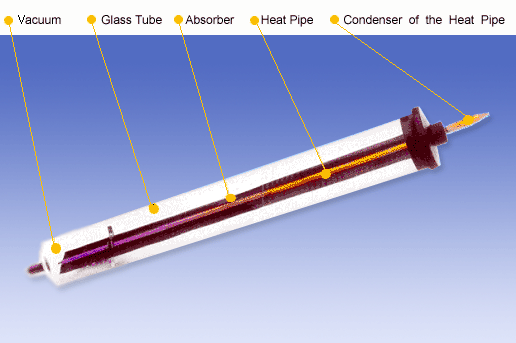SEIDO EVACUATED TUBES were developed by Bejing Sunda and Daimler-Benz Aerospace. Over ten years of thorough research and development resulted in one of the most efficient designs in the industry. Absorber and heat pipe are mounted in a highly stable borosilicate vacuum glass tube. This prevents damage and the heat loss that occurs in conventional solar collectors. The absorber is sputtered with aluminum nitride selective coating to ensure high absorption and high efficiencies even on cloudy days
and under low temperatures.

Heat Pipe Technology
Heat pipes act like a low-resistance thermal conductor. Due to their thermal-physical properties, their heat transfer rate is thousand's of times greater than that of the best solid heat conductor of the same dimensions. Sunda's SEIDO heat pipe is a closed system comprised of two meters of copper tubing, an evaporator section, a capillary wick structure, a condenser section and a small amount of vaporizable fluid. The heat pipe employs an evaporating-condensing cycle. The evaporator section is tightly bonded to the absorber plate, where it captures the heat from the absorber and evaporates the liquid to steam, which moves up to the condenser section. The condenser protrudes out from the evacuated tube and is inserted into the heat exchanger manifold. There this steam will be condensed by water flowing through the manifold. Latent heat energy will be released to the process water through this phase change of vapor to liquid. In vacuum tube solar collectors, the condensation zone is at a higher level than the evaporation zone. The transport medium condenses and returns to the evaporation zone under the influence of gravity. This process is repeated continuously thereby heating the water in the solar loop.
Advantages of the Technology
Selective Coating
The absorber is treated with an aluminum-nitride selective coating to achieve highest efficiency of the heat transfer. The coating is applied using a magnetic sputtering technique. This special optical coating transforms more than 92% of the incoming solar irradiation into heat and reduces less than 8% heat loss.
Advantages of the Technology
Evacuated Tube Technology
Heat pipes are inserted into the aluminum absorbers forming assemblies, which in turn are inserted into the glass tubes. The tubes are made of borosilicate glass which is strong and has a high transmittance for solar irradiation. In order to reduce the convection heat loss, glass tubes are evacuated to vacuum pressure of <10-5 mbar. Sunda uses a patented technique employing high heat and pressure to insure stable glass-to-metal vacuum seals. In order to keep the stability of the vacuum for a long time, a barium "getter" is used. Through evacuating air out of the glass tube the absorber material and the selective coating are protected from corrosion and other environment influences. This ensures a lifetime of at least 15 years without loss of efficiency.
Advantages of the Technology
This ensures a lifetime of at least 15 years without loss of efficiency.
ReplyDeleteWater Repellent